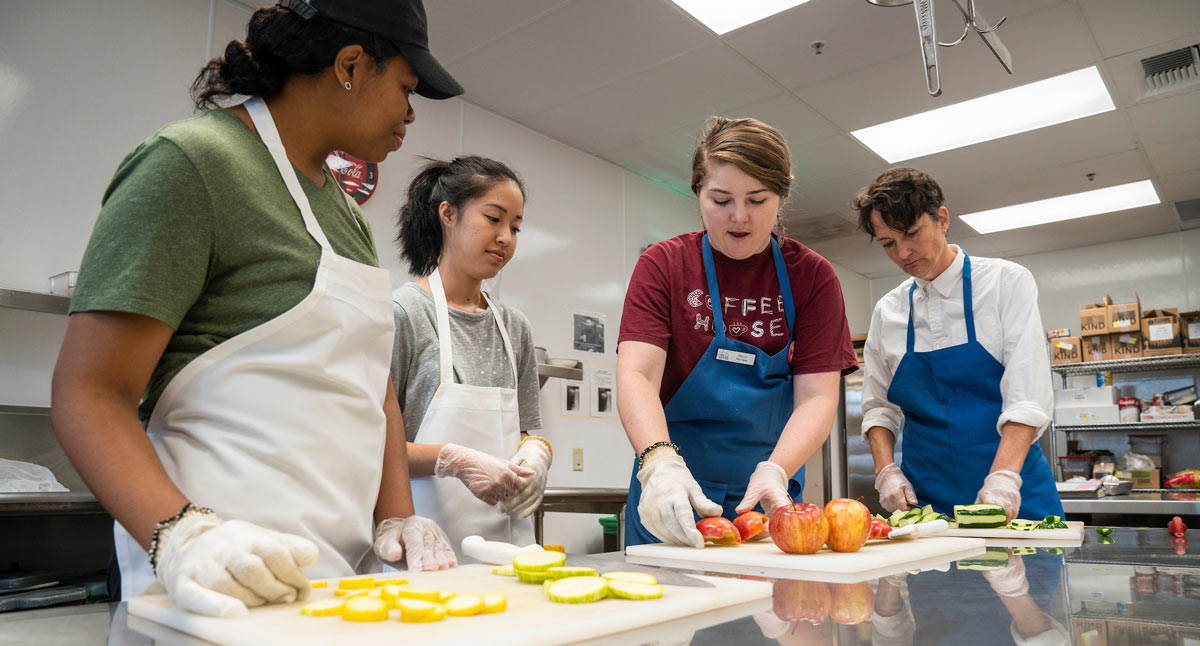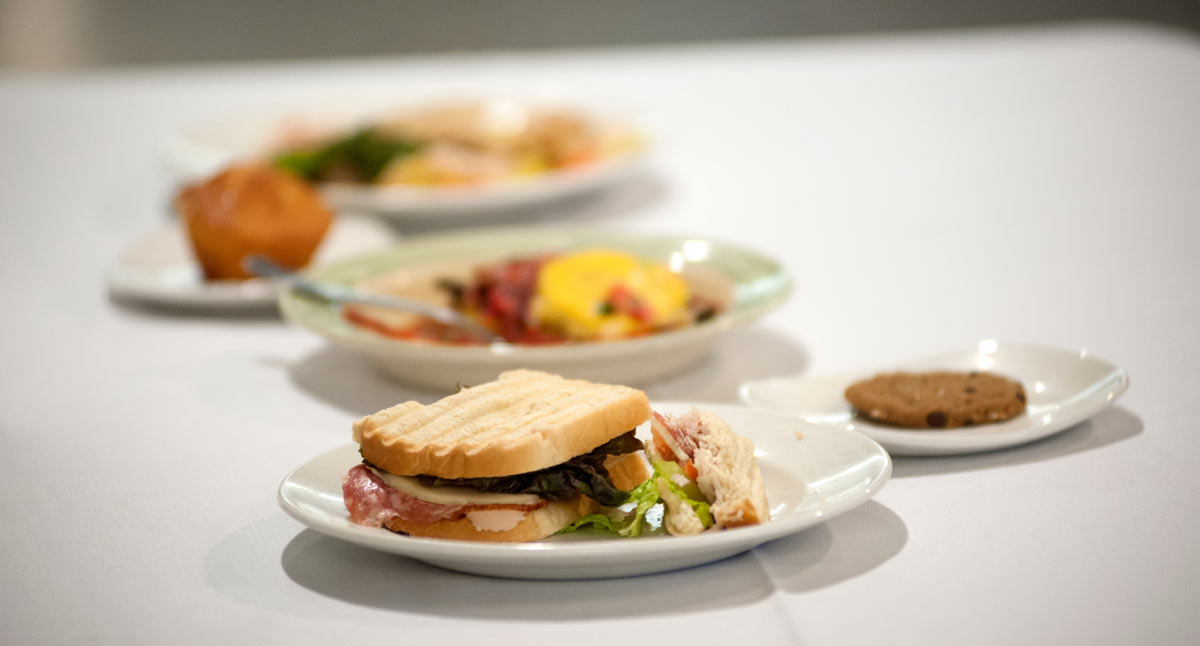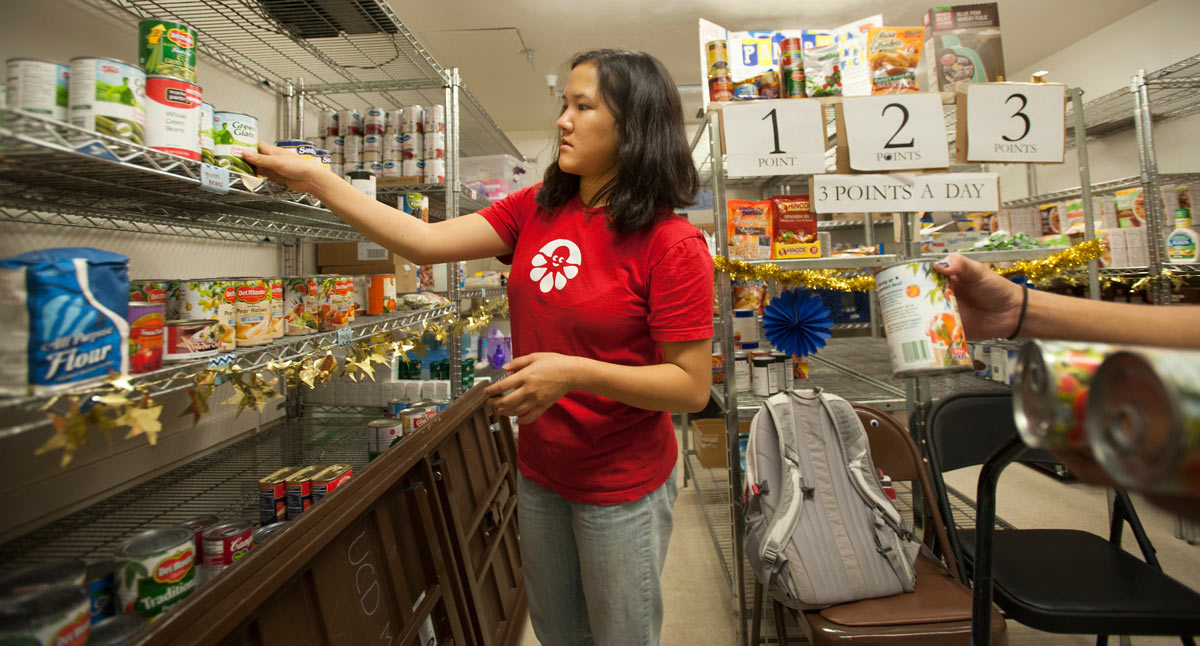
Food Insecurity is a Critical Issue Among Many Students
A 2015 study commissioned by the University of California Office of the President has reported that up to 42% of students throughout the UC system experience high levels of food insecurity; a common finding at colleges and universities across the nation. This adversely impacts the health and educational success of our students. UC Davis students are experiencing similar challenges with food access and affordability. While the campus has established programs to address the issues, their successes and impact on student welfare is unclear.
In response, Chancellor Gary May appointed a task force in February 2018, charged to:
- Review existing food programs and options
- Suggest improvements to existing programs and services
- Make recommendations about what additional programs or options to consider implementing
Since being appointed, the task force has:
- Gathered data from campus and other sources to inform our understanding of food insecurity and barriers to achieving food security affecting UC Davis students
- Sought out constructive ideas on what can be done to enhance food security by conducting individual consultations with students, campus staff and leaders, and external local leaders in food security efforts
- Conducted five focus groups of undergraduate and graduate students to learn about their experiences with food insecurity and campus resources
- Collaborated with the Office of Student Affairs to conduct a student food security survey
This executive summary contains a brief listing of our task force recommendations. The full report which follows provides a more thorough review of the food security data and qualitative information that have informed our recommendations, and more details the campus should consider in implementing the recommendations. In formulating our recommendations, the task force has sought to be constructive and to focus on actions which are solution oriented and can contribute to the cumulative campus efforts.

Key Guiding Principles:
Ensuring food security for students is an opportunity and obligation to the UC Davis community to uphold the Principles of Community.
- Issues of poverty and economic deprivation result in food insecurity, which disproportionately affects diverse groups such as students of color, differing gender and sexual orientation, citizenship status, returning veterans, former foster children, and many others of varying socio-economic classes. This disproportionate burden prevents students from contributing to and benefiting from the experience of UC Davis and is a failure to ensure academic equity for our students.
- Food security for students consists of access to foods to support a healthy active life, to prevent hunger, and to minimize financial concerns and stress regarding consistent availability and affordability of foods for personal and family well-being. This constitutes the most basic concern, but the campus response to food security must also consider the importance of access to high quality and nourishing foods.
- Food security is a fundamental basic need for individual student health. It extends beyond this to the greater university and public good, as it promotes student personal well-being, academic success and facilitates timely completion of their university degree.
- The existence of campus resources and other benefit programs to adequately address food security issues is critical, but equally important is ensuring that students who are at risk are aware of the resources and programs and are able to access them to strengthen personal food security as well as participate in the process of finding solutions that continue to meet their needs.
- The end goal is to eliminate student hunger and food insecurity on the UC Davis campus. It is recognized that this is a complex problem with many contributing factors; it will not be eliminated immediately, nor solely through the recommendations of the task force but we aim to contribute positive solutions and actions toward achieving that goal.
Food insecurity exists on the UC Davis campus. The recent survey data collected in May 2018 by the task force indicates a prevalence of 44% and is in close agreement with data from the UCOP system-wide Global Food Initiative survey. Student comments from the focus groups illustrate and give voice to the student experience of food insecurity, its impact on personal dignity and on academic achievements. This indicates that while numerous positive efforts are being made by the campus and student groups on campus, the problem of food insecurity and hunger still exists. Multiple contributing factors make food insecurity a challenging public health problem. Addressing the issue necessitates continued innovative, strategically planned and implemented, coordinated and multifaceted approaches to meet the needs of food insecure and vulnerable students at UC Davis.
A fundamental question underlying the impact of the programs is determining whether the actions are effectively reaching the students who are most in need. The data regarding use of the ASUCD Pantry and the Fruit and Veggie UP! programs reveal that they are being used by a wide range of students, some of whom are from groups likely to be vulnerable to food insecurity. However it is likely that the programs are relatively underutilized by some groups who experience the most insecurity. Further, it appears that student awareness of campus programs and benefits which enhance the ability to access nutritious foods is not uniform. The task force survey revealed that nearly 30% of respondents were not aware of resources available to them. Thus, the campus must improve communications about the resources and utilize additional channels in social marketing approaches. Accessibility and acceptability of the programs available to students can be enhanced further by examining ways to reduce the stigma associated with their use; which may involve physical location, staffing hours, marketing focus, and practical food literacy information being provided. The launch of the Aggie Compass and associated functions in the MU space is a step in this direction.
The campus needs to ensure sustainability of successful programs, engage in additional innovative approaches with campus units, and continue to build external partnerships that serve both short term and long term student needs. The findings of this task force provide impetus and opportunity for the Chancellor to demonstrate continued leadership and the campus community to take action to address the complicated issue of food security; recognizing its context within associated issues of housing security and mental health.

Task Force Recommendations
Fiscal Sustainability of Campus Food and Basic Needs Programs
We recommend the campus make a commitment to:
-
Ensuring the continued presence and financial stability of vital programs such as the Aggie Compass, that are a hub for food security and emergency basic needs resources.
-
Ensuring financial stability for programs that directly impact the ability to deliver food-centric campus services and resources such as the Student Farm Community Table Project, which grows produce for distribution and provides experiential student education.
-
Finding creative means to increase the number of emergency meal swipe cards.
Student Affairs commits to ensuring that Aggie Compass has a stable funding stream of $200,000, beginning in 2018-19. This may involve a multiyear transition to ongoing resources of this amount. In addition, Student Affairs will continue to support and promote programs that directly impact campus food and basic needs programs and partner with campus and community resources to ensure emergency meals are available.
Updates provided March 28, 2019:
1. Aggie Compass received $200,000 in one-time funds from Student Affairs and SB85 one-time state funding. System-wide basic needs efforts are underway to add basic needs as a permanent line item in the state budget.
2. Fruit & Veggie Up! has been moved under Aggie Compass.
3. The emergency meal swipes program will be continued through the Aggie Compass and Financial Aid Office, using 2018-19 SB85 Hunger Free Campus funds.
Campus Services and Programs That Promote Food Security
We recommend the campus examine options and means to implement improvements in several university programs, especially working with ASUCD to increase the accessibility, size and functionality of The Pantry to better serve students, perhaps through partnership with Aggie Compass. Campus should continue to build and expand external partnerships with groups such as the Yolo Food Bank, Tandem (farm) Properties, the UC Davis Farmers Market, and explore developing unique new programs.
Student Affairs commits to working with ASUCD to increase services and programs, acknowledging the importance of investing in strategies proven to be effective and efficient on student efficacy factors that positively contribute to retention and time to degree. More specifically, we will work to increase the impact of services provided by The Pantry and Aggie Compass.
Update provided March 28, 2019:
During spring quarter, Aggie Compass and the Pantry will launch satellite pantries in four locations around campus and begin work on a mobile pantry. Aggie Compass launched a Basic Needs Guidebook (as part of the UC Davis Now app) that will have a food recovery option, sending push notifications to students when there is post-event food available.
Updates provided Feb. 22, 2019:
A Feb. 22 report shows an increase in Pantry visits 400 to 500 per day in new location.
Updates provided Jan. 24, 2019:
The ASUCD Coffee House is exploring the expansion of its "Pay-it-Forward" program, expanding options for customers to purchase vouchers to be distributed at the ASUCD Pantry.
ASUCD will be looking to increase accessibility to The Pantry by moving the operation from Lower Freeborn up to the first floor of the Memorial Union East Wing. The overall experience will change from a transactional experience by asking for items at a counter and someone else picking them up to more of a supermarket experience where users will "shop" through the store and see everything that is available. They will check out at the end. Also, we are exploring the viability of picking up meals for an entire week all in one transaction versus on a day-by-day basis. The Pantry's soft opening will be Jan. 31 with a grand opening on March 4.
Update provided Dec. 20, 2018:
Aggie Compass and the ASUCD Pantry have entered into a partnership that will allow the Pantry to remain open to students during breaks and unplanned campus closures. This also includes joint fundraisers and projects like A Night to End Campus Hunger Benefit Dinner 2018 and a possible mobile pantry. Aggie Compass is exploring a partnership with Yolo Food Bank that would provide fresh produce to campus each week. Aggie Compass is partnered with Tandem Properties, which provides an average of 500 pounds of fresh organic produce weekly to Aggie Compass programs.
Marketing of Campus Options, Services and Benefits
We recommend the campus increase its outreach and social marketing, work through student organizations and host events to let students know about programs and options for services, with the goal of increasing awareness and improving access to benefits such as CalFresh and campus-based programs to serve students. Emphasis should be placed on reducing stigma, reaching all students, and especially those most vulnerable to food insecurity.
Student Affairs agrees with this recommendation and commits to increasing educational efforts to communicate to student about available resources via our Student Affairs Marketing and Communications unit.
Update provided March 28, 2019:
Aggie Compass is actively promoting CalFresh on campus.
Update provided Dec. 20, 2018:
Aggie Compass marketing/promo project has been submitted to Student Affairs Marketing and Communications. We are in the planning stages of an awareness campaign. Marketing for CalFresh can be funded through Center for Healthy Communities Calfresh Outreach Contract.
Promote Food and Health Literacy
We recommend that the campus develop innovative and engaging culturally relevant informational programs and resources, outreach, and learning opportunities for students to build food and health literacy. Scalable ideas include education programs in the residence halls for freshmen before they embark off-campus living, and videos for YouTube or campus websites on budgeting, cooking skills and how to use fresh produce from the Student Farm. These activities can contribute to the educational mission through experiential learning opportunities if they were, for example, co-led by the Healthy Aggies team, departments of Nutrition and Food Science and Technology, and other campus partners such as Student Housing and Dining Services (SHDS).
SHDS will provide first-year residents with programming and opportunities regarding food and food insecurities. These transitional programs can provide students with the tools necessary to be self-sufficient when selecting and preparing food as well as be knowledgeable of the resources across the campus.
Update:
Discuss with SHDS LT about collaborating with Aggie Compass Basic Needs Center to offer students access to Food and Health literacy programming.
Update provided Jan. 24, 2019:
Aggie Compass has proposed several new programs, each with a food/financial literacy component. These programs have an assessment piece that will help determine effectiveness.
University/State/Federal Policies and Programs
Longer-term strategies must include advocacy for provision of affordable housing for students, and accurate cost-of-living estimates linked to student funding; with goals of avoiding a funding gap that adversely impacts food security. Students should not be faced with untenable choices between food, housing and education. Continued advocacy for revisions to CalFresh regulations for students is needed to eliminate barriers to student enrollment.
It is acknowledged that longer termed strategies are needed. Student Affairs will work with Government Relations to increase opportunities to advocate at the local, state and federal level regarding policies that impact our students.
Update provided March 28, 2019:
UC FSA BN systemwide has identified $15 million in the governor's education budget for basic needs and is working to secure the funds. They are also working to have SB85 Hunger Free Campus funds added as an ongoing item in the state education budget.
Updates provided Jan. 24, 2019:
A USDA/Government Accountability Office report on hunger in colleges was released with recommendations to address CalFresh eligibility requirements for college students. UC FSA BN systemwide is working in Sacramento to move these recommendations forward.
Update provided Dec. 20, 2018:
UC Davis has engaged with city and county officials regarding county homelessness strategy development.
Prioritization and Implementation of Recommendations
We recommend the creation of a committee composed of campus partners working on food access, including faculty, staff and strong student representation. The group should provide leadership in advising the campus regarding priorities, and strategies to accomplish goals, and participate in leveraging campus and external partnerships. It is essential that the Aggie Compass Basic Needs Center be a part of this group as the central hub for campus food security activity. Participation of the Student Farm Community Table Project would provide ongoing awareness of food-production possibilities and limitations as well as social realities, both current and historical, of our food system. The Global Food Initiative Fellows program should be retained and transformed into a Campus Food Initiative Fellows program. These fellows would act as undergraduate and graduate student representatives on the committee. Finally, progress should be monitored with periodic program evaluations and student food security assessments.
Student Affairs will establish a committee to inventory and assess how the campus is currently partnering to provide food access services. The committee will be established during fall 2018.
Update:
Expand focus and attendees of the Dining Advisory Committee.